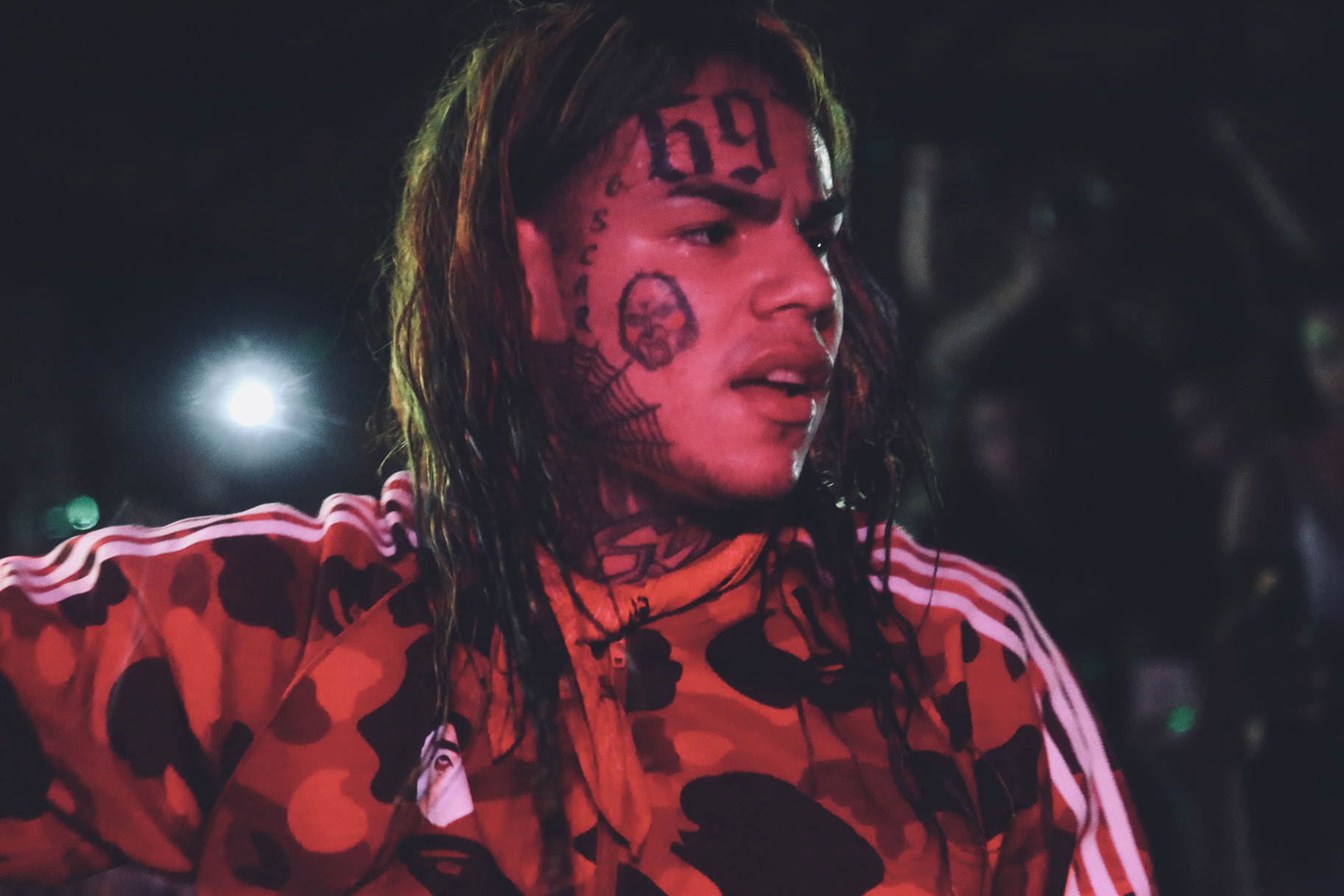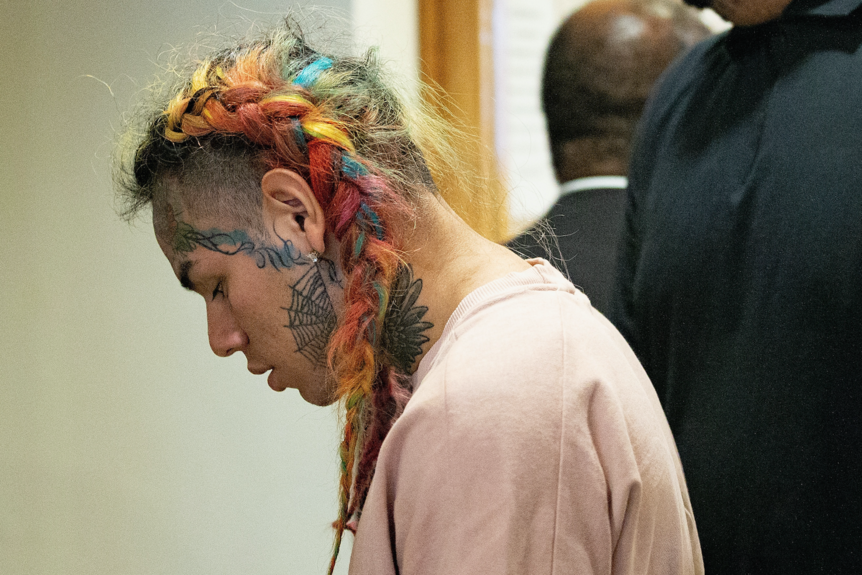Create a free profile to get unlimited access to exclusive videos, breaking news, sweepstakes, and more!
The Deep NYC History Of The Nine Trey Gangster Bloods, The Violent Gang In ‘Supervillain: The Making of Tekashi 6ix9ine'
A new docuseries looks at rapper Tekashi 6ix9ine's relationship with the Nine Trey Gangster Bloods, the Rikers Island-born gang that's been on New York streets for decades.

In February 2019, rapper and Instagram provocateur Tekashi 6ix9ine, then a crossover curiosity from Brooklyn’s rap scene who’d racked up some surprise Billboard Hot 100 hits, pleaded guilty to nine felonies. The federal charges included racketeering, conspiracy to commit murder and armed robbery. He was facing a lengthy prison sentence when a shock twist in his case was revealed — the then-22-year-old took a plea deal on the condition that he would testify in the concurrent investigations of his associates in the Nine Trey Bloods, the notorious street gang.
The rapper’s winding saga, from his rise over the past decade to the consistent legal battles that have led him to become perhaps the world’s most famous “snitch,” is outlined in Showtime’s new docuseries, “Supervillain: The Making of Tekashi 6ix9ine.” The three-part series, which premiered on Sunday and will air over the next two weeks, angles on the rapper’s life in Brooklyn’s Bushwick neighborhood and his entrée into and symbiotic relationship with the Nine Trey Bloods, a violent subset of New York’s East Coast Bloods — which is itself a subset of the notorious Bloods street gang that began in L.A. For nearly the past 30 years, the Nine Trey Bloods has been a fixture in certain New York neighborhoods and widely associated with the city’s street crime.
‘[The gang] wreaked havoc in New York City,” U.S. Attorney Geoffrey S. Berman said last year after a major bust of Nine Trey members that followed Tekashi 6ix9ine’s testimony.
As outlined in the docuseries, the Nine Trey Bloods’ origin traces back to 1993 and New York’s notorious Rikers Island jail complex. Omar Portee, a.k.a. O. G. Mack, and Leonard "Dead Eye" McKenzie, formed the United Blood Nation while incarcerated, mainly as protection against the Latin Kings and the Netas, a Puerto Rican gang, as both were dominant forces in that time. Nine Trey, the citywide branch under the United Blood Nation banner, quickly grew in scale and notoriety by selling street drugs like heroin and crack cocaine, initially mostly around Harlem. Meanwhile, members were warring with other gangs and establishing street cred as they became involved in shootings, robberies, and assaults.
Soon, localized branches of the gang were established citywide: 1-8 Trey, Valentine Gang, Grenade Gang and Sex Money Murda were all Bronx-birthed sets, while G-Shine was a Brooklyn branch — though some sets entered the fold later and many eventually spread out beyond their original locations. Indicators of affiliation with the Bloods and Nine Trey have for decades included distinct tattoos, hand signals, and the display of red clothing items, like bandanas, caps, and clothing.
Throughout the 1990s and into the next decade, Nine Trey gradually spread down the East Coast into New Jersey and as far south as North Carolina, as its members racked up sex trafficking and racketeering charges, and many reentered prison.
In 1999, when he was 27, Portee was released from Rikers and worked to further grow his empire into a powerful force of the streets. While inside at Rikers, he’d gathered hundreds of prisoners to consolidate and strike back against the jail’s powerful Latin gangs via violent slashings and attacks — including, in some cases, cuts from the ear to the lip, a grisly marking known as a “permanent telephone,” the New York Times reported in a 2000 feature article.
Portee, the paper also reported, had spent time in Los Angeles running with the Bloods in his early adulthood before returning home and entering Rikers for a second time, on an alleged murder charge. He told a Times reporter during an interview in the Bronx that his goal was for his members to gain a political education and to end Black-on-Black crime. In the article, allusions to the community support spearheaded decades earlier by the Black Panthers are made at one point. Officers with the New York Police Department generally considered this alleged effort an absolute fraud, the paper reported.
In 2002, Portee was convicted of 10 counts of criminal activity, including racketeering, murder, and conspiracy. He’s currently being held in ADX Florence in Colorado.
Since then, minor arrests and massive operations to take down Nine Trey members have bubbled up nearly annually. In one coordinated effort in 2006, dubbed “Operation Nine Connect,” officers collaborating from 31 agencies in seven New Jersey counties netted at least 96 arrests of Nine Trey members and their affiliates. “State Police Lead Team of 500 Officers to Decapitate Most Violent Set of Bloods Street Gang,” the headline of the police news release announced.
“We found the Nine Trey set of the Bloods were responsible for more violence and crime than any other source at this time,” Lt. Colonel Frank Rodgers of the New Jersey State Police said after the massive operation.
In 2013, five men and three women who were alleged Nine Trey members were arrested in a major drug operation in North Carolina. The following year, Thaddaeus Snow, then Nine Trey’s leader, was arrested and later convicted by a federal jury for racketeering, robbery, cocaine distribution, sex trafficking and weapons charges.
However, none of these created a media sensation as big as the 2019 news of Tekashi 6ix9ine’s cooperation with authorities and the subsequent arrests of his associates. The bust included Aljermiah Mack, one of Nine Trey's leaders at the time, who was sentenced to 17 years in prison in February 2020 on racketeering and drug charges.
Now, many eyes are on the rapper, who is out of the home confinement granted upon his April release from prison amid the COVID-19 pandemic. He’s very much back at it on Instagram, too. And it appears his old habits will die hard, as he sparred with rapper Meek Mill at an Atlanta club on Feb. 14.
It seems that Tekashi 6ix9ine’s attitude about his security and perhaps his future status as a cooperating witness against his fellow Nine Trey members were telegraphed in 2018 when the rapper appeared on The Breakfast Club radio show days before his arrest.
“There's only one thing I fear in life,” he told the hosts. “No, two things. I fear God and I fear the FBI.”

























